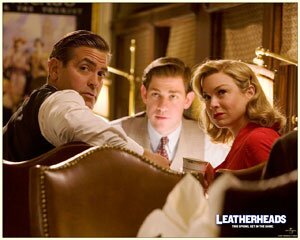MOVIE REVIEW- Score! April is football season!
 How does George Clooney get so much work done and still have a life when he spends all his time watching old movies?
How does George Clooney get so much work done and still have a life when he spends all his time watching old movies?
 The opening sequence tells you all you need to know about the state of football in 1925. War hero Carter "The Bullet" Rutherford (John Krasinski), continuing his education, is the most valuable player in a well-attended college football game in a large stadium. When someone suggests he might go pro, everybody laughs.
The opening sequence tells you all you need to know about the state of football in 1925. War hero Carter "The Bullet" Rutherford (John Krasinski), continuing his education, is the most valuable player in a well-attended college football game in a large stadium. When someone suggests he might go pro, everybody laughs.
Cut to a pro football game in a muddy pasture (Oscar for Best Performance by a Cow). Though past his prime, Dodge Connolly (Clooney) is the hero of this game; but there are more people playing than watching, so who cares? Pro teams are folding faster than Dodge's bunch, the Duluth (Minnesota) Bulldogs, can travel by train to play them. Dodge gets to idea to change all that by recruiting Carter, making The Bullet a Bulldog.
It's an expensive proposition because Carter's manager, CC (Jonathan Pryce), plays the football equivalent of hardball; but it pays off because crowds turn out to cheer the war/football hero.
But is he really a war hero? Inquiring minds want to know, and the Chicago Tribune's editor (Jack Thompson) wants to inform them. He assigns the story to his best reporter, Lexie Littleton (Zellweger), with the promise of an assistant editor desk if she gets the scoop. (She's "not really the homemaker type," she says; but that can change.)
Besides being the only reporter with a tip that Carter's fame is exaggerated, if not fabricated, Lexie's also the prettiest. This doesn't escape Dodge's attention, and when she starts traveling with the team, the stage is set for the two men to fight over her. Dodge overhears Lexie's true intentions and has to weigh his feelings for her against Carter's importance to the team's future.
The historical context ranges from Prohibition-era speakeasies to the congressional appointment of football's first commissioner (Peter Gerety in a quietly excellent performance), whose job is to take a sport that's barely organized and make it regimented. Dodge rails against "rules," saying they'll be "the ruination of the game."
The period is also represented by Randy Newman's ragtimey score, some of it played onscreen by the composer in a speakeasy scene. (Okay, ragtime was over by 1925, but it still sounds good.)
Clooney directed with great attention to detail, not only of the period itself but how it's been portrayed on film, blending the actual ‘20s with the classic comedy styles of the ‘30s; but with a slight undercurrent of seriousness, even depth, those just-for-fun movies lacked.
Clooney is repeating Burt Reynolds' career without the mistakes. Oh, he appears in an occasional clunker, but he's able to play a wider range of roles. He got into directing sooner and has gotten better at it, and as an actor he's able to deliver wry without the ham as he tosses off lines like, "You're only as young as the women you feel."
Zellweger was right to return to Chicago-– the city, if not the musical-– and the period, which suits her better than most contemporary settings.
Leatherheads is an example of a lightweight entertainment that overachieves without rubbing our noses in its accomplishments. Smart enough to know when to be silly and when to sober up again, it's a touchdown for all concerned.
#